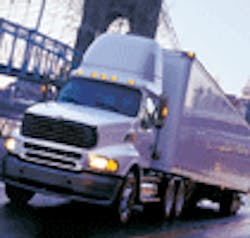A recent study by the National Highway Traffic Safety Administration (NHTSA) touting the benefits of electronic stability control systems for tractor-trailers is getting high marks from safety advocates and truck component suppliers alike. It also backs up with detailed data a long-held conviction in trucking: that such technology can not only save lives and reduce injuries, but save fleets money, too.
“This study certainly validates what we have been saying for some time: not only do stability control systems save lives, they also can positively affect a fleet’s bottom line,” Steven Keppler, interim executive director of the Commercial Vehicle Safety Alliance (CVSA), told FleetOwner.
“We are hopeful that the insurers will take notice of this research and help to work with fleets that are adopting this technology to help them out and recognize their investments,” he added. “We also hope that shippers will take notice of fleets adopting this technology as well and start to put more value on safety-conscious fleets when choosing their transportation provider.”
The study – titled “Safety Benefits of Stability Control Systems For Tractor-Semitrailers” – examined the performance of electronic stability control (ESC) systems and roll stability control (RSC) systems for tractor-trailers.
Conducted by the University of Michigan Transportation Research Institute (UMTRI) under a cooperative agreement between NHTSA and Meritor Wabco, the study made several conclusions regarding commercial-truck stability technologies:
- Assuming that all existing 5-axle tractor-trailers operating on U.S. roads were fitted with RSC, the expected annual rollover relevant safety benefit would be a reduction of 3,489 crashes, 106 fatalities, and 4,384 injuries.
- Alternatively, assuming that all existing 5-axle tractor-trailers operating on U.S. roads were fitted with ESC, the expected annual combined rollover and directional (yaw) instability relevant safety benefit would climb—producing a reduction of 4,659 crashes, 126 fatalities, and 5,909 injuries.
- Because ESC addresses both rollover and yaw instability crashes and it is more effective in mitigating rollover crashes (through additional braking capabilities over RSC), the net annual expected benefit for an ESC system was found to be greater than for RSC.
- The study found that ESC systems provided more overall safety benefit than RSC system, although the difference between the estimated effectiveness of RSC and ESC varied among crash scenarios.
- Assuming ESC was fitted to all tractor-trailers, savings from rollovers prevented by ESC are estimated at $1.527 billion annually, and from LOC [loss of control] crashes prevented at $210 million annually, for a total of $1.738 billion annually.
- Assuming RSC was fitted to all tractor-semitrailers, savings from rollovers prevented at estimated at $1.409 billion annually, and from LOC crashes prevented at $47 million annually, for a total estimated benefit of $1.456 billion per year.
CVSA’s Keppler noted another important aspect of the NHTSA study, which regards antilock braking system (ABS) effectiveness in minimizing jackknife situations. “This is something we have been watching for awhile and frankly have been concerned about – i.e. a lack of education and attention to ABS operation,” he explained. “There is still not enough education on ABS and how important it is to maintain it – especially since many of these advanced safety systems [ESC and RSC] rely on it to work effectively.”
The greater capability of full-stability control systems vs. roll-only systems as evidenced by the study’s findings did not come as a surprise to industry suppliers, either.
“It's somewhat obvious that full-stability control systems provide more benefits than roll-stability technology only – that’s already apparent,” Alan Korn, Meritor Wabco director of engineering, told FleetOwner.
“What this study does, though, is helps fleets look not so much at the technology but at the kinds of accidents they suffer from in terms of dollars and cents,” he said. “If you operate short-wheelbase trucks more often than not on slick surfaces, you may need that full-stability control package. But if you operate longer-wheelbase trucks on dry roads, maybe rollovers are more prevalent. Each fleet needs to study their own accident data and hold it up to this study to determine which technology will best meet their needs.”
“The difference in cost is critical because we’re in a situation where this technology is not mandated; it’s up to the fleets to choose to install it,” added John Morrison, Meritor Wabco president. “This study will help fleets in terms of what specific safety goals they are trying to achieve. A study like this helps get the numbers out there and further the education process to a wider fleet audience concerning this technology.”
“More and more fleets are recognizing full-stability technology as a valuable option for helping to mitigate accidents and improve their safety records,” said Joe McAleese, president & CEO of Bendix Commercial Vehicle Systems LLC. “The answer to the question of full-stability vs. roll-only options has been a topic of discussion for some time and becomes much clearer to the industry through the results of this report. There’s just no comparison in terms of the added protection full-stability technology can provide.”
Some safety experts feel the data in this study should encourage the development of government regulations to mandate this technology for tractor-trailers. “The life-saving benefits of electronic stability control continue to be demonstrated, regardless of vehicle, in study after study,” David Kelly, former NHTSA administrator and now president of safety consulting firm Storm King Strategies, told FleetOwner. “We need to put this on every truck as soon as possible before another family is needlessly destroyed.”
About the Author
Sean Kilcarr
Editor in Chief
Sean Kilcarr is a former longtime FleetOwner senior editor who wrote for the publication from 2000 to 2018. He served as editor-in-chief from 2017 to 2018.
